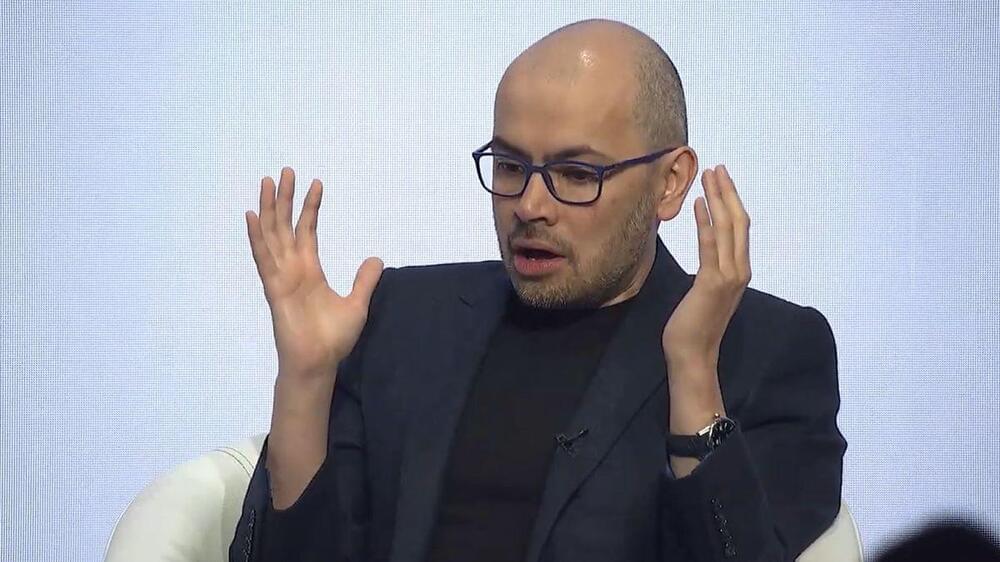Category: media & arts – Page 47
The Fermi Paradox: Fine Tuned Universe
The first 150 people to join Planet Wild clicking this link or adding my code ISAAC7 later will get their first month for free https://planetwild.com/r/isaacarthur/.…
If you want to get to know them better first, check out their latest video raising baby sharks and releasing them back into the wild: https://planetwild.com/r/isaacarthur/m17
Our universe is a strange place, with underlying rules we’re only just beginning to understand, but could the strangest thing of all about our Universe be that we are able to live here to observe it in the first place?
Join this channel to get access to perks:
/ @isaacarthursfia.
Visit our Website: http://www.isaacarthur.net.
Join Nebula: https://go.nebula.tv/isaacarthur.
Support us on Patreon: / isaacarthur.
Support us on Subscribestar: https://www.subscribestar.com/isaac-a…
Facebook Group: / 1583992725237264
Reddit: / isaacarthur.
Twitter: / isaac_a_arthur on Twitter and RT our future content.
SFIA Discord Server: / discord.
Credits:
The Fermi Paradox: Fine-Tuned Universe.
Episode 456; July 18, 2024
Produced, Narrated \& Written: Isaac Arthur.
Graphics:
Jeremy Jozwik.
Select imagery/video supplied by Getty Images.
Music Courtesy of Epidemic Sound http://epidemicsound.com/creator.
Music Courtesy of Epidemic Sound.
Lombus, \
Creation of the Humanoids 1962
Mind uploading and androids and neuromorphic components.

Hip-Hop History in Space: Missy Elliott’s Song Beamed to Venus by NASA
“Both space exploration and Missy Elliott’s art have been about pushing boundaries,” said Brittany Brown. “Missy has a track record of infusing space-centric storytelling and futuristic visuals in her music videos, so the opportunity to collaborate on something out of this world is truly fitting.”
The planet Venus just received a gift from NASA, but this time it’s not in the form of a spacecraft or lander, but instead in the form of a hip hop song transmitted by the agency’s Deep Space Network, “The Rain (Supa Dupa Fly)”, which was originally released in 1997 by the hip hop artist, Missy Elliott. Not only is Venus the favorite planet of Missy Elliott, but this also marks only the second time a song has been transmitted into the unknown, with the first being “Across the Universe” from The Beatles in 2008.
The song was sent to Venus on July 12, 2024, at 10:05 am PDT by the Deep Space Station 13 radio dish antenna located in Barstow, California, with the command being sent from NASA’s Jet Propulsion Laboratory in Pasadena, California. The song took approximately 14 minutes to reach Venus traveling at the speed of light.

Current AIs only have the IQ level of a cat, asserts Google DeepMind CEO
The CEO of Google DeepMind has compared the IQ levels of contemporary artificial intelligence (AI) agents to domestic cats. “We’re still not even at cat intelligence yet, as a general system,” remarked Hassabis, answering a question about DeepMind’s progress in artificial general intelligence (AGI). However, research is progressing fast, with some huge cash and compute investments propelling it forward. Some expect it to eclipse human intelligence in the next half-decade.
Demis Hassabis, the co-founder and CEO of Google DeepMind, made the artificial intelligence vs. cat IQ comparison in a public discussion with Tony Blair, one of Britain’s ex-Prime Ministers. The talk was part of the Future of Britain Conference 2024, organized by the Institute for Global Change.
Hassabis highlights that his work is not focused on AI but on AGI. It gives us more perspective on how he is looking at the computer vs cat comparison. Yes, a contemporary AI can sometimes write, paint, or make music in a convincingly human-like fashion, but an ordinary house cat has a lot more general intelligence. “At the moment, we’re far from Human-level intelligence across the board,” admitted Hassabis. “But in certain areas like games playing [AI is] better than the best people in the world.”
Dormant Alien Empires
When listen to void of space, we hear no alien signals, but could the galaxy be quiet because ancient empires slumber inside it? Watch my exclusive video Planetary Archives & Stasis Vaults: https://nebula.tv/videos/isaacarthur–… Nebula using my link for 40% off an annual subscription: https://go.nebula.tv/isaacarthur Get a Lifetime Membership to Nebula for only $300: https://go.nebula.tv/lifetime?ref=isa… Use the link gift.nebula.tv/isaacarthur to give a year of Nebula to a friend for just $30. Join this channel to get access to perks: / @isaacarthursfia Visit our Website: http://www.isaacarthur.net Join Nebula: https://go.nebula.tv/isaacarthur Support us on Patreon:
/ isaacarthur Support us on Subscribestar: https://www.subscribestar.com/isaac-a… Facebook Group:
/ 1,583,992,725,237,264 Reddit:
/ isaacarthur Twitter:
/ isaac_a_arthur on Twitter and RT our future content. SFIA Discord Server:
/ discord Credits: Dormant Alien Empires Episode 455a; July 14, 2024 Produced, Narrated & Written: Isaac Arthur Editors: Darius Said & Mark Surber Graphics: Mihail Yordanov Jeremy Jozwik Ken York YD Visual LegionTech Studios Sergio Botero Udo Schroeter Music Courtesy of Epidemic Sound http://epidemicsound.com/creator Lombus, “Cosmic Soup” Sergey Cheremisinov, “Labyrinth” Stellardrone, “Red Giant”, “The Divine Cosmos” Select imagery/video supplied by Getty Images.

AI Appears to Rapidly Be Approaching Brick Wall Where It Can’t Get Smarter
World’s smallest violin for AI execs.
Researchers are ringing the alarm bells, warning that companies like OpenAI and Google are rapidly running out of human-written training data for their AI models.
And without new training data, it’s likely the models won’t be able to get any smarter, a point of reckoning for the burgeoning AI industry.
“There is a serious bottleneck here,” AI researcher Tamay Besiroglu, lead author of a new paper to be presented at a conference this summer, told the Associated Press. “If you start hitting those constraints about how much data you have, then you can’t really scale up your models efficiently anymore.”
Cyborg Civilizations
We often contemplate cyborgs, people enhanced by machines, but what would a civilization built upon cybernetics be like?
Watch my exclusive video Planetary Archives \& Stasis Vaults: https://nebula.tv/videos/isaacarthur–…
Get Nebula using my link for 40% off an annual subscription: https://go.nebula.tv/isaacarthur.
Get a Lifetime Membership to Nebula for only $300: https://go.nebula.tv/lifetime?ref=isa…
Use the link gift.nebula.tv/isaacarthur to give a year of Nebula to a friend for just $30.
Join this channel to get access to perks:
/ @isaacarthursfia.
Visit our Website: http://www.isaacarthur.net.
Join Nebula: https://go.nebula.tv/isaacarthur.
Support us on Patreon: / isaacarthur.
Support us on Subscribestar: https://www.subscribestar.com/isaac-a…
Facebook Group: / 1583992725237264
Reddit: / isaacarthur.
Twitter: / isaac_a_arthur on Twitter and RT our future content.
SFIA Discord Server: / discord.
Credits:
Cyborg Civilizations.
Episode 454a; July 7, 2024
Produced, Written \& Narrated by: Isaac Arthur.
Graphics:
Bryan Versteeg.
Jeremy Jozwik.
Music Courtesy of Epidemic Sound http://epidemicsound.com/creator.
Select imagery/video supplied by Getty Images.
South Korea’s First Robot Suicide. What Happened? | Vantage with Palki Sharma
Even robots are overworked.